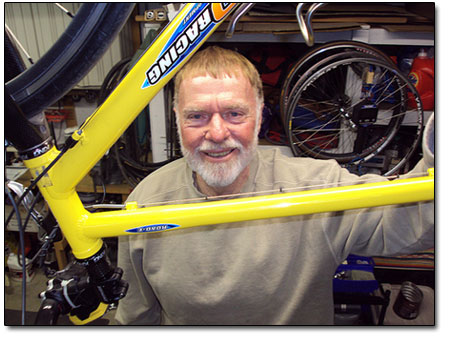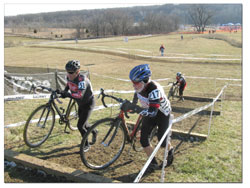|
| ||||
| Silver streak
by Kinsee Morlan
“We kind of solve the problems of the day,” says Axthelm with a smile, as steam from the baking bread hits the cold December air. A few weeks ago, Axthelm was building up a little steam of his own in Bend, Ore., where, at the age of 76, he won first place in the men’s 75-79 title at the USA Cycling Cyclocross National Championships. Cyclocross is a type of bike racing reserved for the cold fall and winter shoulder seasons. It consists of short laps on a course featuring everything from grass and sand to steep hills and wooden barriers that require riders to dismount and run with their bikes slung over their shoulders. “Hey Walt,” says a young man standing in line at the popular bakery. “I heard you kicked some butt out in Bend!” Axthelm shyly admits the win and shakes the man’s hand. Then he begins the task of tracing his long cycling career, and how he made the switch from racing off-road motorcycles to mountain bikes, then road bikes and, finally, cyclocross. After 30 years in motocross, Axthelm retired from the sport in 1981. He was inducted into the Motorcycle Hall of Fame in 2001 for being one of the first Americans to compete in the International Six Day Trials (now called the International Six Day Enduro). He’s noted as being one of the most “influential off-road riders of the 1950s and 1960s,” but he shrugs off the accomplishments saying that back then, it was more about having fun than winning races and getting sponsorships. Nowadays, he says, the sport’s been ruined by the influx of corporate money. “It ceased being fun,” Axthelm explains. “It’s like with any sport, when it’s no longer fun and it becomes work, it’s time to throw in the towel.” So Axthelm did just that. He quit motocross and, somewhat ironically, went and worked for a big corporation. He was a contract engineer for Boeing for 15 years, during which time he essentially gave up all sports, worked long hours and became someone he admittedly didn’t really like. “I got fat,” Axthelm says, his clear blue eyes focusing in on the cup of coffee in his hand. “I hated myself and figured I better do something about it, and that’s when I got into mountain biking. It was an easy transition coming from motocross.” Axthelm got his first motorbike, a Schwinn Whizzer, when he was 14 years old. He got his first mountain bike, a Schwinn High Sierra, at the age of 50, and it wasn’t long before his competitive side came out again. As Axthelm puts it, a life without competition isn’t really a life worth living – even if it does cause you a little pain. Back when mountain biking was just getting going, Axthelm says, people bought too big of frames because they based the size on road bikes. “The Schwinn High Sierra was way too big for me,” Axthelm recalls. “I road it in a race in Big Bear (California), and I was almost in tears at the finish because I had walked so much on the course. I just didn’t have the biking strength at that time.”
After his first few mountain bike races, Axthelm started a workout regime that he continues to this day. He does some weight-lifting, tries to ride about 6,000 miles a year, takes vitamins, doesn’t smoke and eats healthily. “Pretty simple, really,” says Axthelm when inquiring age-fearing minds ask how he stays in such great physical and mental shape. Axthelm raced in the first-ever World Mountain Bike Championships held in Durango in September 1990. He was 56 years old and managed to get fifth place in the master’s class. At the time, Axthelm was living in Seattle, but he couldn’t stand the grey. The sunny skies paired with the burgeoning cycling scene in Durango made the town a perfect place for Axthelm to set his sights on. Within five years, he found an engineering job and moved himself and his wife, Jo, to Durango. “I have a very supportive wife,” says Axthelm. “She followed me through a part of my motorcycle career, and she’s out at every race with me supporting me now. Jo – her name is just ‘Jo’ because she hates the name ‘Josephine’ – used to ride singletrack on a mountain bike tandem with me before her knees gave out.” The couple’s move to Durango started Axthelm on his road-biking career. He bought a custom-made bike from local framemaker Chris Herting, of 3D Racing, and began accumulating what is now a quiver of eight bicycles that takes up most of his garage. “It’s almost like you have to ride every type of bicycle here in town,” Axthelm says, looking around at the myriad of cyclists fueling up at Bread. Axthelm races in the Iron Horse every year. He does well road racing, but as he gets older, he sees fewer and fewer competitors his age and, by default, is pitted against younger and younger riders. “There aren’t many old riders here in town,” he says. “That’s what’s difficult because I’m riding against some of these young guys, and I could be their granddad.” In Bend at the Cyclocross National Championships, Axthelm says he was lucky to have a half dozen cyclists in his category. Axthelm isn’t wrong when he calls cyclocross the fastest growing cycling discipline. There’s talk of the sport being included as a demonstration sport in the Winter Olympics in Vancouver, Canada, according to Cyclocross Magazine. And right here in Durango, the sport is seeing a major growth spurt thanks to the Fort Lewis College Cyclocross Series, which wrapped up in December. “I like it because it’s all-out for 45 minutes then you’re done,” Axthelm says. “The difficult part is that it’s hard to get into a rhythm because they’ll throw in stairs or if you have a straight away, they’ll throw in barriers where you have to dismount and jump over and things like that to where there’s no rhythm and you’re just doing wind sprints all the time. The fact that you’re riding an unsuspended bike on rough terrain with drop handlebars like a road bike, it’s just an interesting sport.” With all the running, Axthelm says he’s noticed a need to do more work on his core. And even though he picked up first place this year, he’ll train harder in 2010 in hopes of doing even better. He plans on riding the Iron Horse next year, too, and as the oldest rider out there, he wants to set some records. “God willing, I’ll keep riding,” says Axthelm. “I told Ed Zink (of Mountain Bike Specialists) here in town that I want to ride the Iron Horse when I’m 80.” •
|
In this week's issue...
- December 18, 2025
- Let it snow
Although ski areas across the West have taken a hit, there’s still hope
- December 18, 2025
- Look, but don't take
Lessons in pottery theft – and remorse – from SW Colorado
- December 11, 2025
- Big plans
Whole Foods, 270 apartments could be coming to Durango Mall parcel



 Like many serious cyclists in Durango, Walt Axthelm typically starts his day at Bread, the bakery on the northeast side of town.
Like many serious cyclists in Durango, Walt Axthelm typically starts his day at Bread, the bakery on the northeast side of town.